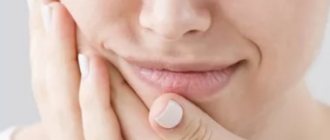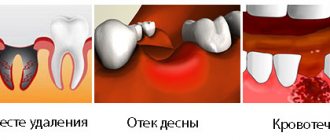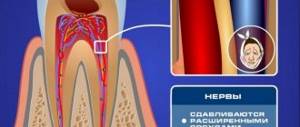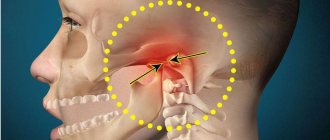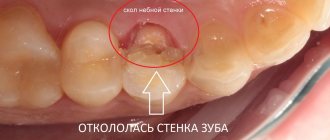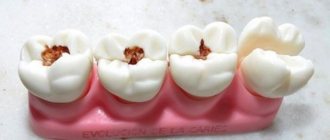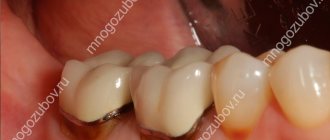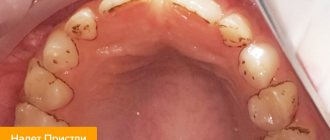What does it mean to “catch a tooth”: expert opinion
It is impossible to freeze the tooth itself, that is, its components such as enamel, dentin and pulp. Therefore, this phrase is absolutely incorrect and is never used in official medicine. But this concept is often used in everyday life, for example, when teeth hurt after a person was hypothermic or was blown away. Some people say this when they have pain due to acute respiratory viral infections, acute respiratory infections, influenza and other non-dental pathologies, although this is again wrong.
Important! Are you feeling cold? It is not surprising that against this background your teeth ache. However, an alarming sign may also indicate the presence and exacerbation of various diseases of a dental and non-dental nature.
Sometimes they also say “the nerve of the tooth caught a cold” or the phrase “the nerve was blown” is used. This usually means inflammation of the neurovascular bundle of fibers (pulp), securely hidden by enamel and dentin. But in this case, the cause of the pathology is not colds and hypothermia; rather, they act as catalysts leading to an exacerbation of the inflammatory process already existing in the tissues in the initial or chronic stage. In official medicine, the disease is called pulpitis.
Why does inflammation occur?
A “closed” tooth is practically sterile inside. When, as a result of damage to the integrity of the dental unit, pathogenic bacteria enter it, caries, pulpitis develop, and the dental nerve may become inflamed. So, the list of main reasons why you can get a cold tooth includes:
- the presence of large carious lesions;
- mechanical damage (chips, fractures, breaks);
- improper turning of the unit during prosthetics.
Symptoms of a cold dental nerve:
- attacks of severe throbbing pain, discomfort worsens when eating hot, cold, sour foods, sweets;
- aching pain in the gum area, radiating to the jaw;
- the soft tissues around the “affected” unit swell, become hyperemic, and painful on palpation;
- Body temperature may rise slightly (up to 37–37.5 degrees).
The main reasons associated with the unpleasant phenomenon
What happens to a person when he gets hypothermia, gets a strong wind, or catches an infectious or viral disease accompanied by inflammation of the ear-nose-throat area? His body temperature rises, a cough and runny nose appears, and all surrounding tissues swell. Against this background, pain arises, which most often covers the entire head, often radiating to the jaw and teeth - this is one of the main reasons why there is a feeling as if the teeth were blown. But there are other factors that lead to this phenomenon. Let's consider them further.
Exacerbation of existing dental pathologies
With hypothermia, as well as any diseases of the body, the immune system sharply decreases, which means that pathologies that already existed before but were not treated become aggravated and progress. For example, caries, chronic pulpitis and periodontitis. Against the background of decreased immunity, untreated caries can very quickly become complicated by pulpitis and periodontitis[1].
On a note! This unpleasant phenomenon is typical for people with weakened immune systems: children, the elderly, women during pregnancy and breastfeeding.
During this period, a cyst or granuloma may make itself known, which gradually grew and remained undetected for a long time. And periodontitis often leads to the appearance of a lump on the gum, filled with pus and periodically breaking out through the fistulous tract. Also, some people, just after they have been blown by a strong wind or in a draft, discover that they have flux and all the accompanying symptoms: their cheek and face swell, their body temperature rises, and, naturally, their teeth hurt badly.
“In our office the air conditioner is always on, which once gave me a very serious blow. Against this background, my jaw began to ache. Later I noticed that the teeth under the fillings also hurt. When I recovered, it still continued to hurt under one filling. I had to go to the dentist... At the appointment they said that there was periodontitis, which developed due to poor-quality treatment of caries and incomplete filling of the canals. This was an unpleasant surprise! As the doctor said, under the influence of a cold, the sore, which had not manifested itself in any way before, became aggravated and worsened..."
Tanika, review from the dental portal gidpozubam.ru
2. Features of the treatment of viral and infectious diseases
Both in case of normal hypothermia, and ARVI, influenza, sore throat, herpes virus and other pathologies of a similar nature, the patient is prescribed to drink plenty of fluids in order to quickly remove toxins from the body, support the immune system and avoid dehydration. The following drinks are often consumed for this purpose: rosehip decoction, tea with lemon, fruit drinks and compotes with berries - they all contain large amounts of vitamin C, which has a destructive and irritating effect on the enamel.
Consequence: the enamel becomes hypersensitive, reacts to the temperature of food and any mechanical stress. Due to the abuse of such drinks, erosions appear on hard tissues, and their resistance to cariogenic bacteria drops sharply.
To avoid this problem, doctors advise thoroughly rinsing your mouth with plain water after drinking acidic drinks.
Poor oral hygiene
After hypothermia and infectious viral diseases, many feel severe weakness and malaise, and therefore stop performing thorough daily oral hygiene. Some people completely forget about the brush and toothpaste, which is why plaque quickly accumulates in the mouth, which is the best breeding ground for bacteria that cause caries and other dental diseases.
On a note! After you have recovered, it would be a good idea to purchase a new brush, since the old one may retain pathogenic bacteria that can provoke an inflammatory process in the oral cavity.
ENT diseases
With otitis media, tonsillitis, sinusitis and sinusitis, strange symptoms sometimes occur, for example, the ear and teeth may hurt at the same time. This is again due to the fact that in a sick person, not only the organs where the pathology occurs swell and become inflamed, but also all adjacent areas. In this case, the pain often does not have a clear localization, radiating to the head, jaw, and eyes.
When ENT diseases are neglected or treatment tactics are incorrect, bacteria spread from the affected tissues to healthy ones, penetrate with blood and lymph into the oral cavity, provoke the development of the same caries, inflame the nerve of the tooth (pulpitis occurs) and periodontal tissue.
On a note! The opposite situation also happens: diseased teeth contribute to the development of ENT pathologies. For example, units of the upper jaw affected by deep caries, pulpitis, periodontitis and cysts can lead to the development of odontogenic sinusitis.
Inflammation of the facial nerve
This nerve has branches that cover all areas of the face. Therefore, when it becomes inflamed, the jaw and teeth may become sore. Often the pain has no clear localization. Pathology, again, can occur against the background of hypothermia, impaired blood circulation in the tissues, as well as various dental and non-dental diseases.
Why do the roots of teeth become inflamed?
- As a consequence of advanced untreated caries or pulpitis. In this case, we are talking about infectious periodontitis, in which inflammation gradually spreads to the periodontium and rapidly progresses. In some cases, the cause of apical periodontitis may be complications of sinusitis or osteomyelitis (the so-called extradental form).
- When injured. The development of traumatic periodontitis can be provoked not only by heavy objects hitting the face or a strong blow to the jaw during a fall, but even minor, but constantly recurring microtraumas. As a rule, traumatic periodontitis is particularly acute.
- Improper treatment of pulpitis can also lead to inflammation of the tooth root - drug-induced periodontitis. The inflammatory process develops as a result of the contact of drugs containing arsenic or other potent chemical compounds on the surface of the periodontium. Sometimes the root becomes inflamed as a result of an acute allergic reaction to certain medications used in the conservative treatment of pulpitis.
Other factors leading to periodontitis
- Obstruction of root canals.
- Perforation of the root wall or cavity.
- The appearance of cysts, which can be located around the very root of the tooth or grow into the maxillary sinuses.
- Damage to the root during the removal of the stump or pin.
In some cases, we are not talking about apical, but about the so-called marginal periodontitis, in which not only the apex of the tooth root is affected, but also the gums in its cervical part. The treatment of such severe pathology should be carried out by a specialized periodontist.
Signs of nerve inflammation
As mentioned above, often the phrase “the tooth (nerve) caught a cold” is associated precisely with the exacerbation of the inflammatory process in the pulp, which made itself felt after hypothermia of the body and a sharp decrease in immunity against the background of various diseases. In this case, the following symptoms will indicate that the teeth have blown out:
- severe pain that intensifies and does not go away for a long time after eating hot and cold food, being in the cold, at night. Pain sensations spread throughout the jaw and are not always relieved with tablets from a home medicine cabinet,
- hyperemia (swelling and redness) of the gums in the area of the affected unit,
- there may be chips, deep carious cavities and cracks on the diseased element,
- The more advanced the process, the higher the likelihood of an increase in body temperature and the appearance of general malaise.
“The other day I blew out the nerve of a tooth. The pain was unbearable, the pills didn’t help, so I simply couldn’t stand it for more than two days. I went to the doctor. I don’t remember how some people manage to walk with pulpitis for several months and even years. This is just torture! Modern treatment methods make it possible to cure everything in no time, rather than endure this nightmare!”
Stanislav, review from 32top.ru
Inflammation of a wisdom tooth
The location of this tooth in the oral cavity is sometimes difficult to reach for a doctor and is therefore considered the most difficult to treat. The wisdom tooth begins to erupt closer to the age of eighteen, which is why it received the name “comes with wisdom.” When it erupts, painful discomfort is felt, the reason is the absence of milk teeth in this place previously, so the incisor, growing, cuts through the gum. Swelling of the cheek and inflammation of the gums begins, which covers the area of the wisdom tooth; various symptoms may also appear, the lymph nodes become inflamed, swallowing becomes difficult, and the temperature rises.
A slight swelling can be considered normal, and the cause of the inflammatory process can be several factors:
- The wisdom tooth is looking for a place to come out, but not finding it creates inflammation in the gum and nerve;
- When the gums come out, there is not enough free space for normal growth, it begins to put pressure on the teeth in the neighborhood, which causes inflammation;
- The location of the growth of wisdom teeth depends on the structure of the oral cavity; if the shape is irregular, inflammation often occurs and cysts form.
To determine the presence of an inflammatory process in a wisdom tooth, you will need an x-ray; there are characteristic signs of inflammation:
- Sensation of unpleasant taste;
- Swelling of the gums around the tooth;
- The resulting pus spreads in the oral cavity, forming a pungent odor;
- When a wisdom tooth grows, the pain radiates to the temple or ear.
In this case, consulting a doctor is mandatory. If proper treatment is not started on time, it can lead to severe pain and many complications, the formation of purulent abscesses and phlegmons, which are subsequently resolved surgically.
Today, more and more dentists are of the opinion that the wisdom tooth does not need to be treated, but should simply be removed, because it's more trouble than it's worth. The complexity of treating its roots is determined by its location, and the doctor will make a decision in each individual case: to treat or remove a wisdom tooth.
If the third molar hurts
Very often, after a wind blows, or after hypothermia, a wisdom tooth begins to ache. This may be due to all of the reasons listed earlier. But sometimes this signals an exacerbation of pathologies that are characteristic directly of the third molar:
- eruption is too long, complex and not always correct: “eights” pass through the bone and touch the nerve endings, sometimes they rest against neighboring elements of the row, put pressure on them and destroy them, provoking vague pain sensations,
- pericoronitis: acute and often purulent inflammation of the gingival hood hanging over the “sage”, under which food debris and bacteria become clogged.
Treatment of dental hypothermia
What to do if your dental nerve hurts? You need to go to the dentist within the next few days from the onset of symptoms. The fact is that the pain may temporarily subside, but the inflammatory process will continue and strike at the wrong time.
However, if you have a toothache and the dentist is still a day or two away, you can try to relieve the pain with the help of folk remedies.
Aspen bark
Aspen has antipyretic, antitumor, wound-healing, bactericidal, astringent, analgesic and anti-inflammatory properties. For toothache, rinsing your mouth with aspen decoction will help. Just buy aspen bark at the pharmacy, and do not rip it off the trees: in this case, the bark will not be treated for parasites.
Calamus root
Calamus root, which is sold in pharmacies, has analgesic properties, including mild numbness. Traditional healers advise making an alcohol tincture with calamus, and then mixing it with propolis and rinsing the sore spot. But you need to prepare it in advance - the drug is infused for 12 days. Or you can take a stick of calamus and chew it with the tooth that hurts. The relief effect will occur within 5-10 minutes.
Baking soda rinse
One of the simplest methods of soothing toothache is rinsing with soda. Mix soda, a little salt and water and rinse your mouth with this solution. You can add a couple of drops of iodine to it. The remedy itself does not have an analgesic effect, but it helps if the cause of the pain is inflammation.
Gargling with oak bark
Oak bark is known to have antiseptic, analgesic, astringent and anti-inflammatory properties. Make a decoction of oak bark and rinse your mouth all day - there are no contraindications regarding doses.
Onion and garlic
The onion peels need to be poured with boiling water and left for half an hour, and consumed when the broth becomes warm. Take a sip of the decoction into your mouth and hold it for 15 minutes, then spit it out and take a new dose. Do this three times.
Garlic has an antiseptic and analgesic effect. Therefore, you can apply a cut clove of garlic to a sore tooth. But let’s say right away: garlic is weak as a pain reliever - it does not penetrate sufficiently into the deep layers of the mucous membrane, having only a superficial effect. And if you want action from the inside, then you will have to eat so much garlic that even before visiting the dentist you will be hospitalized in the gastroenterology department.
Propolis
If you have propolis at home, break off a small piece and apply it to the sore tooth. Don't spit it out, but walk with it for a while. Propolis can relieve spasms, pain and inflammation. In addition, for pennies you can buy an alcoholic tincture of propolis at the pharmacy and rinse your mouth by diluting 2-5 drops in water.
Drops for toothache
Toothache drops contain camphor, valerian, peppermint oil and cloves. The components help if toothache is caused by infection. Apply 1-2 drops to a cotton swab and apply to the sore spot.
Alcohol
Alcohol is known to dull the sensitivity of nerve endings. To dull the sensations, it is not at all necessary to get drunk; it is enough to rinse the sore tooth with vodka or cognac. And if you decide to take it orally, remember: within a day or two after this, the body will be less susceptible to medicinal painkillers, including those that the doctor injects before filling the tooth.
Painkiller tablets for toothache
If the tooth hurts severely, then folk remedies may be ineffective. Then the heavy artillery comes into play - painkillers.
If the pain is of moderate intensity, Ibuprom, Solpadeine, Tamipul and similar common drugs are suitable. But it is not recommended to use old-generation painkillers, such as analgin: they are harmful to the stomach.
Anti-inflammatory drugs that help eliminate toothache and at the same time fight inflammation include aspirin, ibuprofen, Nise, and paracetamol.
But if the listed drugs did not help, then more powerful drugs are needed, such as Ketanov. However, the drug is so strong that it has many side effects and contraindications. Therefore, if possible, it is better to refuse it.
Also try to perform local anesthesia by applying cotton wool with lidocaine or special “freezing” gels for teeth to the sore tooth: among them “Kamistad” or “Dentol”.
What you can and cannot do at home
If you think that your tooth has blown out, and even more so, you have discovered the symptoms described earlier, then you need to consult a doctor who will determine the true cause of the problem and provide treatment appropriate to the situation. But not everyone is in a hurry to see a dentist. Some people prefer to wait until their signs of hypothermia and various non-dental diseases have passed. What is appropriate and what absolutely cannot be done during this period? The answer is in the table below.
| Can | It is forbidden |
|
|
If you have a cold or a toothache, what should you do at home? You can only fight symptomatic manifestations (pain, fever), strengthen the immune system in every possible way, and also treat the underlying disease that caused the unpleasant symptom. But if the causes of the pathology are dental problems, and this is precisely the case in most cases, then stopping the symptoms will not help to correct the situation for a long time. In this case, the only right decision is a visit to the dentist.
Medicinal treatments
So, what to do if your tooth gets a cold? Many people try to cope with the main symptom of this disorder—pain—with the help of potent painkillers. However, you need to understand that this is only a temporary measure that can only be used as first aid until you see a specialist.
Kopylova Lyubov
implant surgeon, dentist-therapist
If a gum or tooth is blown out, and as a result an inflammatory process occurs, this condition requires mandatory treatment under the strict supervision of a doctor. Therefore, the first thing to do is to get to the dentist as quickly as possible.
Since cold teeth often really hurt, before starting treatment with a specialist, you are allowed to take medications that relieve discomfort. You can take Nurofen, Paracetamol, Ketorol, Tempalgin and other painkillers. Lidocaine can be used as a local anesthetic. It is generally not recommended to take them before consulting a doctor, as this can greatly complicate the diagnosis of the pathology.
Nurofen
Paracetamol
Ketorol
Tempalgin
Lidocaine
Before starting treatment, the dentist conducts a thorough examination and, if necessary, sends the patient for an X-ray examination of the affected area. As a rule, the inflammatory process is clearly reflected in the image, and the dentist can easily determine further treatment tactics. Thus, in the treatment of the dental nerve, either a surgical method is used, in which the dentist removes soft tissue, or a conservative method - with the use of antiseptics, non-steroidal anti-inflammatory drugs and antibiotics. Antibacterial agents may also be needed if gum tissue is damaged.
Kopylova Lyubov
implant surgeon, dentist-therapist
You should not delay treatment: the rapid development of the infectious process caused by simple hypothermia can lead to serious complications - up to the complete loss of the diseased tooth and tissue necrosis.
What treatment options can your dentist offer?
Let's consider what the doctor will do if it turns out that hypothermia, viral and infectious diseases have become catalysts for dental problems.
For caries, pulpitis, periodontitis
As a rule, in this case, the patient requires a competent endodontist dentist who will qualitatively clean, treat and seal the root canals of the diseased unit. If necessary, the specialist will also remove the pulp.
Depending on the severity of the pathology, treatment may require 1-3 or more visits to the clinic. So, during the conservative treatment of pulpitis (preserving the pulp) and periodontitis, the doctor will put medications and antibiotics into the canals, cover them with a temporary filling, and repeatedly take x-rays. Only after the source of infection has been completely eliminated will you be given a permanent filling. If a row element has been severely undermined by disease and destroyed, it may need to be strengthened with a pin and inlay, as well as an artificial crown.
Important! Today, better treatment of pulpitis, periodontitis, as well as cysts and other formations is facilitated by the use of modern optical technology, for example, a microscope. Using this device, the specialist sees all the branches of the root canals, completely removes the infection, hermetically seals and carries out highly aesthetic restorations.
For purulent formations
If it turns out that the pain is caused by flux, fistula, cyst, granuloma and abscess, then doctors will dissect the tissue and ensure the outflow of purulent contents using drainage, then apply sutures. During the rehabilitation period, the patient will be prescribed antibiotics, rinses, symptomatic treatment (painkillers, anti-inflammatory, wound healing), and physiotherapy.
For increased sensitivity
Strengthening procedures - remineralization and fluoridation - will help get rid of the consequences of consuming acidic drinks during the treatment of various diseases and eliminate the sensitivity of hard tissues. At home, it is recommended to consume more products with calcium, as well as purchase remineralizing pastes with fluoride, calcium hydroxyapatite, and beneficial natural ingredients (chamomile, propolis).
On a note! If there is increased sensitivity on units with crowns and fillings, then it is important to check the quality of adherence of the structures to the hard tissues and walls of the tooth. It is necessary to make sure that there are no cracks or chips, that the seal is not broken, and that the service life of artificial restorations has not come to an end, otherwise they must be replaced with new ones. It is also important to understand whether an inflammatory process has developed under the filling and crown, because then the product will have to be removed and the root canals treated using endodontics.
How to treat aching pain in teeth?
A treatment plan is drawn up after the diagnostic results, when the cause of the pathology is identified and pain is localized. Conventionally, several techniques can be distinguished that are used depending on the factors contributing to the occurrence of pain.
- Therapeutic treatment. It is prescribed when the main cause of aching pain is caries or periodontal disease. In case of caries, filling or endodontic treatment is carried out (if bacteria have penetrated the pulp). In case of periodontal inflammation, special ointments and antiseptics are prescribed, curettage is performed, and in severe cases, teeth are splinted.
- Prosthetics. In the presence of a wedge-shaped defect and serious damage, dental prosthetics are performed with single crowns or bridges. In case of enamel pathologies, the doctor may recommend veneers, which are installed to achieve a certain aesthetics.
- Restoration and strengthening of enamel. What to do if all your teeth ache? If the patient has weakened and thinned enamel, it is necessary to strengthen it. First of all, the doctor treats the enamel surface with special compounds based on calcium and phosphorus, and also prescribes a special diet and means that strengthen the immune system and the health of the body.
To eliminate pain, painkillers (Nurofen, Nimesil and others) can be prescribed. If the aching pain is not associated with dental problems, treatment is carried out by doctors of relevant specializations.
